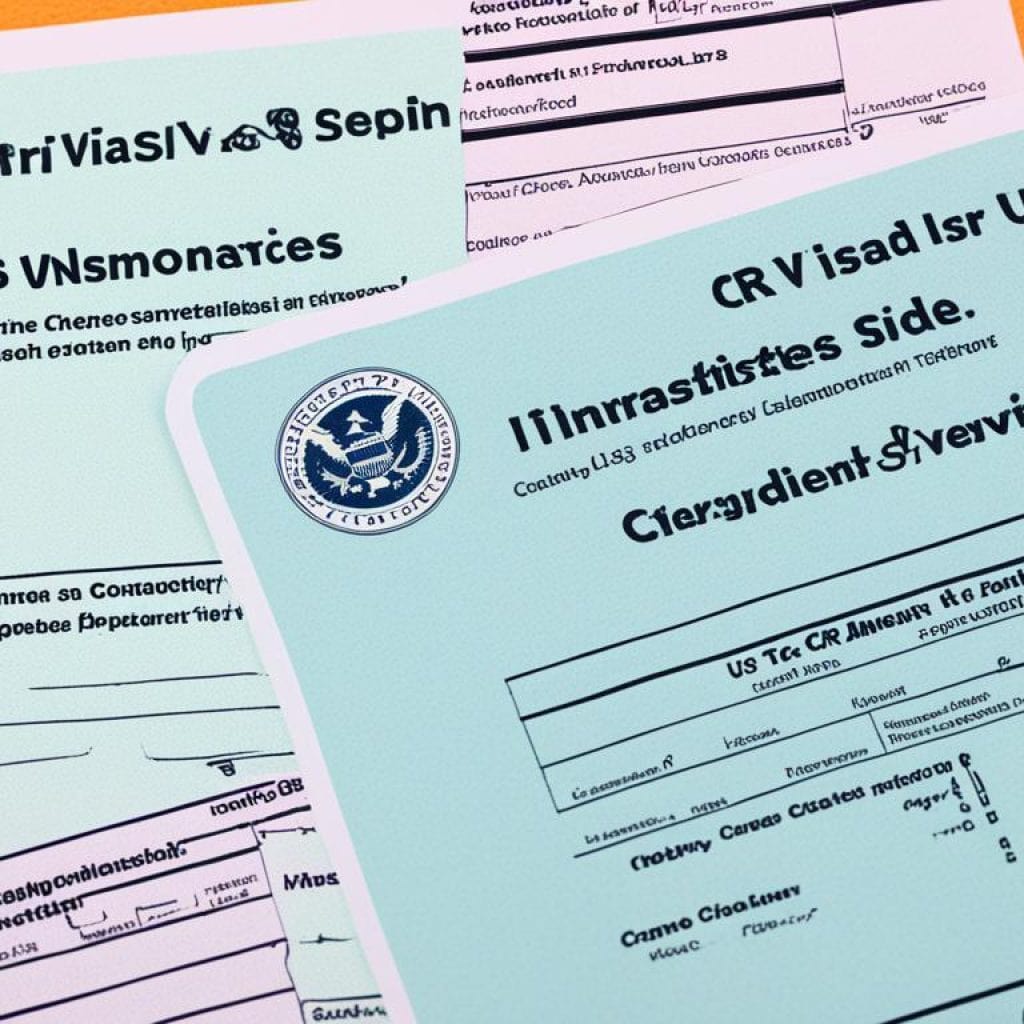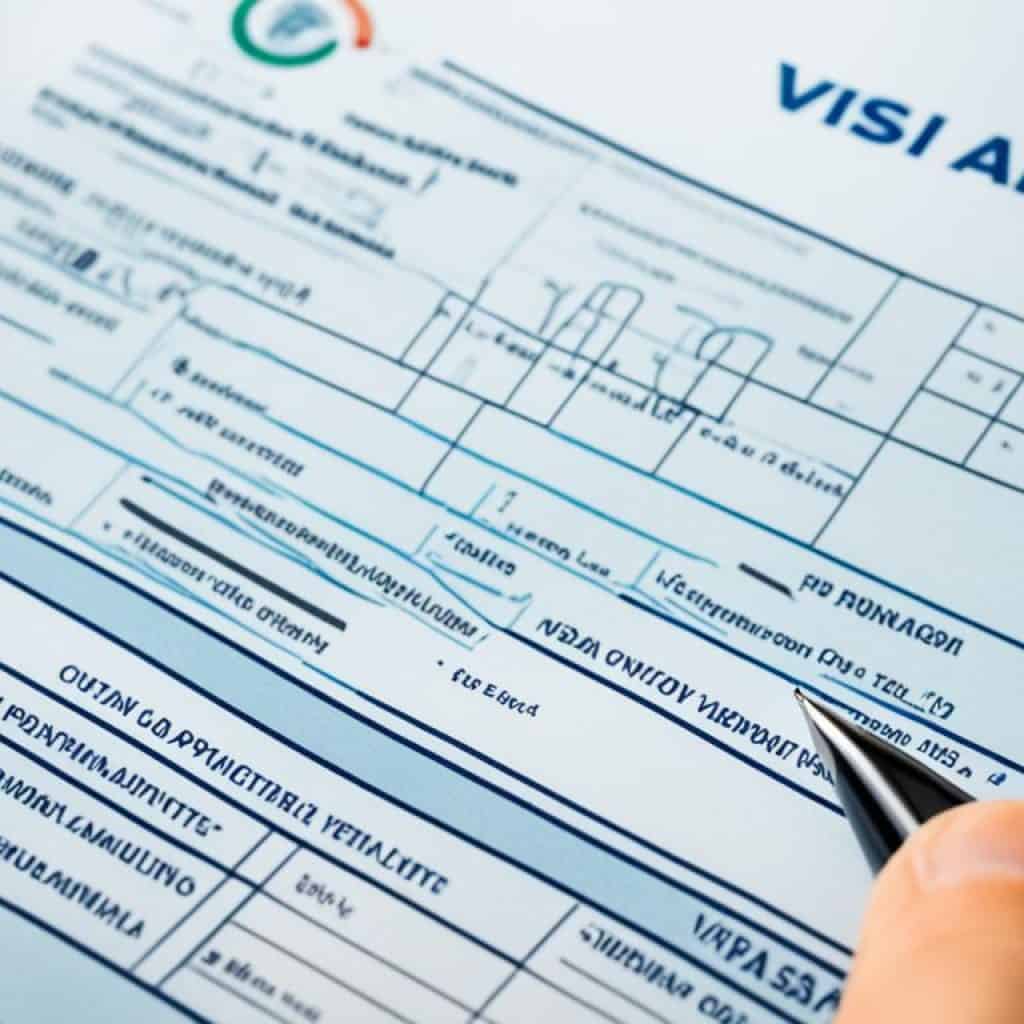Are you dreaming of living in the USA with your spouse? The IR1 Visa might be the key to turning that dream into a reality. This visa provides a pathway for spouses to obtain permanent residency in the United States, allowing you to build a life together in this diverse and vibrant country. But how does the IR1 Visa process work? What are the requirements to qualify? And what are the rights and protections you can expect as a permanent resident? In this comprehensive guide, we will explore all these questions and more, providing you with the essential information you need to embark on your journey towards a new life in the USA.
Key Takeaways:
- The IR1 Visa allows spouses of US citizens or green card holders to obtain permanent residency in the USA.
- Both US citizens and green card holders can sponsor their foreign spouse for an IR1 Visa.
- The IR1 Visa requires proof of a valid and authentic marriage.
- Financial support and income requirements must be met by the sponsoring spouse.
- The IR1 Visa provides rights and protections as a permanent resident of the USA.
IR1 Visa Requirements
In order to qualify for an IR1 Visa, there are several requirements that must be met:
- Sponsor: The sponsor must be a US citizen or a legal permanent resident (green card holder).
- Marriage: The couple must be lawfully married, and a valid marriage certificate must be provided as evidence.
- Authenticity of Marriage: The authenticity of the marriage must be proven through supporting documentation, such as photographs and flight itineraries.
- Financial Support: The sponsor must pledge to financially support their spouse and meet the income requirements.
- US Domicile: The sponsor must have a US domicile, meaning they must either live in the US or demonstrate plans to return with their foreign spouse.
The visa application process involves filing Form I-130, which is the Petition for Alien Relative, with the US Citizenship and Immigration Services (USCIS). Once the petition is approved, the case is sent to the National Visa Center (NVC) for further processing. The applicant will then go through consular processing, including attending a visa interview at the local US Embassy or Consulate.
Example Documentation for Authenticity of Marriage:
“Our love story transcends borders. Here are some of the documents we submitted to prove the authenticity of our marriage:
- Photographs from our wedding ceremony and other important moments in our relationship.
- Flight itineraries and hotel bookings from our travels together.
- Joint bank account statements, joint lease agreements, and shared utility bills.
These documents provided a strong foundation for our application and demonstrated the genuine nature of our marriage.”
– John and Emily Doe, IR1 Visa beneficiaries
Meeting the IR1 Visa requirements is crucial for a successful application. By providing the necessary documentation and demonstrating the authenticity of the marriage, couples can navigate the visa application process with confidence.
| Requirements | Details |
|---|---|
| Sponsor | US citizen or legal permanent resident |
| Marriage | Lawfully married with valid marriage certificate |
| Authenticity of Marriage | Supporting documentation such as photographs and flight itineraries |
| Financial Support | Pledge of financial support and meeting income requirements |
| US Domicile | Living in the US or demonstrating plans to return with the foreign spouse |
CR1 vs IR1 Visa: Understanding the Differences
When considering spousal visas for immigrating to the US, it’s important to understand the key differences between the CR1 and IR1 Visas. These visas share the common goal of allowing spouses to join their US citizen partners in the United States. However, they possess distinct characteristics that impact the immigration process and residency status. Let’s delve into the dissimilarities:
CR1 Visa
The CR1 Visa is suitable for spouses married to a US citizen for less than two years. This visa grants conditional residency, meaning the couple must live together in the US for two years before obtaining full permanent residency. The CR1 Visa is valid for two years, during which the couple must demonstrate that their marriage is legitimate and continue to reside in the US.
IR1 Visa
The IR1 Visa, on the other hand, is designed for spouses who have been married to a US citizen for two years or more. This visa offers permanent residency, providing a more direct pathway to a green card. The IR1 Visa is valid for ten years, and there is no requirement for a conditional residency period. Spouses with an IR1 Visa can immediately enjoy the benefits and protections of permanent residency in the US.
Here’s a simplified comparison of the CR1 and IR1 Visas:
| Visa Type | Spouse’s Duration of Marriage to a US Citizen | Residency Status | Length of Visa Validity | Conditional Residency Period |
|---|---|---|---|---|
| CR1 Visa | Less than two years | Conditional Residency | Two years | Yes, two years |
| IR1 Visa | Two years or more | Permanent Residency | Ten years | No |
Understanding the differences between the CR1 and IR1 Visas is essential for couples seeking to navigate the immigration process. The choice between the two visas depends on the duration of the marital relationship and the desire for immediate permanent residency or conditional residency.
Note: The table below summarizes the key disparities between the CR1 and IR1 Visas:
Visa Type: CR1 Visa
Spouse’s Duration of Marriage to a US Citizen: Less than two years
Residency Status: Conditional Residency
Length of Visa Validity: Two years
Conditional Residency Period: Yes, two years
Visa Type: IR1 Visa
Spouse’s Duration of Marriage to a US Citizen: Two years or more
Residency Status: Permanent Residency
Length of Visa Validity: Ten years
Conditional Residency Period: No

IR1 Visa Processing Time and Costs
The IR1 Visa processing time and costs are key factors to consider when applying for this immigration option. Understanding the timeline and financial obligations associated with the IR1 Visa can help applicants plan accordingly.
Processing Time
The current average wait time for an IR1 Visa is approximately 9-11 months, although this can vary. Specifically, the processing time for Form I-130, which is part of the IR1 Visa application, takes around 11 months on average.
Costs
The CR1/IR1 Visa application process involves various costs that applicants should be aware of. The following are the typical expenses associated with the CR1/IR1 Visa:
- Filing Form I-130: The filing fee for Form I-130 is $535.
- Processing the Immigrant Visa Application: The immigrant visa application processing fee is $325.
- Medical Examination: The medical examination required for the visa application incurs varying fees, which applicants should confirm with the designated medical professionals.
- Additional Costs: There may be additional expenses for translations, passports, birth certificates, and travel arrangements. These costs should be considered while budgeting for the CR1/IR1 Visa application.
- Removal of Conditions Fee: CR1 Visa holders are required to file a fee for the removal of conditions after two years. The specific amount for this filing fee should be checked with the relevant authorities.
It’s important to keep in mind that these costs are subject to change, so it is essential to consult the official sources and websites for the most up-to-date information regarding the fees and expenses related to the CR1/IR1 Visa application.
By understanding the processing time and costs associated with the IR1 Visa, applicants can better prepare themselves for the financial commitments and timeline involved in the application process.
| Processing Time | Costs |
|---|---|
| The current average wait time for an IR1 Visa is approximately 9-11 months. |
|
Applicants should note that these figures are subject to change, so it is essential to consult the official government websites or seek professional advice to obtain accurate and up-to-date information regarding the processing time and costs for the IR1 Visa.
The IR1 Visa Application Process
Embarking on the journey to obtain an IR1 Visa requires navigating through the consular processing, marking a crucial step in the process. This involves applying and attending an interview at the local US Embassy or Consulate. Let’s dive into the details of the IR1 Visa application process to gain a better understanding of what it entails.
Filing the Form I-130
The application process commences with the US citizen sponsor filing Form I-130 with the United States Citizenship and Immigration Services (USCIS). This form serves as the official petition to establish the relationship and eligibility between the sponsor and the foreign spouse.
Case Transfer to the National Visa Center (NVC)
Upon approval of the Form I-130, the case is transferred to the National Visa Center (NVC). The NVC plays a pivotal role in processing the application and guiding the applicant through the subsequent steps.
Completing the Form DS-260
The NVC will instruct the applicant to complete Form DS-260, the immigrant visa application. This form collects essential biographical information and provides the applicant with an opportunity to present details regarding their background and eligibility for the IR1 Visa.
Guidance on Fees and Documentation
Throughout the process, the NVC will provide detailed guidance on the payment of applicable fees and the submission of necessary documentation. These documents may include passports, birth certificates, marriage certificates, and any other supporting evidence to establish the authenticity of the marriage and relationship.
Visa Interview and Medical Examination
After the completion and submission of Form DS-260, the applicant will be scheduled for a visa interview at the US Embassy or Consulate. The consular officer will conduct the interview to further evaluate the applicant’s eligibility and intentions. It is crucial to be well-prepared, gather all required documentation, and provide truthful and concise answers during the interview.
In addition to the interview, a medical examination is a mandatory requirement to ensure that the applicant meets the health standards set by the US government. The applicant must complete the medical examination at an approved medical facility.
Approval and Issuance of the Visa
Upon successful completion of the interview, medical examination, and the submission of all required documents, the consular officer will make a decision on the visa application. If approved, the IR1 Visa will be issued, providing the foreign spouse with the permission to travel to the United States.

| Steps | Description |
|---|---|
| Filing the Form I-130 | The US citizen sponsor submits Form I-130 to establish the relationship and eligibility. |
| Case Transfer to the NVC | Upon approval, the case is transferred to the NVC for further processing. |
| Completing the Form DS-260 | The applicant completes Form DS-260, the immigrant visa application. |
| Guidance on Fees and Documentation | The NVC provides guidance on fee payments and the submission of necessary documents. |
| Visa Interview and Medical Examination | The applicant attends a visa interview and completes a medical examination. |
| Approval and Issuance of the Visa | If approved, the IR1 Visa is issued, granting permission to travel to the United States. |
IR1 Visa Interview and Documentation
The IR1 Visa interview is a crucial step in the application process, where the consular officer assesses the eligibility and authenticity of the applicantâs marriage and supporting documentation. It is important to be well-prepared and provide truthful answers to ensure a successful outcome. Here is a list of required documentation that the applicant should bring to the interview:
- A valid passport
- Photographs
- Completed medical examination forms
- All required civil documents
The consular officer may ask questions about the applicant’s relationship, marriage, and other relevant details. They may also request additional information or clarification on certain documents. It is essential to remain calm and provide accurate responses to the best of your knowledge.
After a successful interview, if approved, the consular officer will issue the IR1 Visa. The visa will be valid for a specific period, typically depending on the medical examination date. During this validity period, the applicant will receive the final green card, granting permanent residency in the United States.
CR1 and IR1 Visa: Conditional Residence and Removal of Conditions
The CR1 Visa, classifiable as a conditional residency visa, is granted to beneficiaries who have been married to a US citizen for less than two years. Upon entering the United States with the CR1 Visa, the beneficiary and their US citizen spouse must file a petition to remove the conditions from the green card within two years. This process entails the submission of Form I-751.
Conversely, the IR1 Visa, unlike the CR1 Visa, does not impose a conditional period on the beneficiary. The permanent resident card issued through the IR1 Visa category remains valid for ten years. Regardless, both CR1 and IR1 visa holders must renew their green card after the initial validity period.
| Visa Type | Conditional Period | Validity Period |
|---|---|---|
| CR1 Visa | Yes, for two years from entry | Renewal after initial validity |
| IR1 Visa | No | Renewal after initial validity |

Removal of Conditions Process (Form I-751)
The removal of conditions from the CR1 Visa is accomplished by filing Form I-751 within two years of the beneficiary’s entry into the United States. This form serves to demonstrate that the marriage is genuine, even after the initial conditional period. The US citizen spouse and the beneficiary must submit joint evidence of their shared life and ongoing bona fide marriage. The evidence should cover joint financial accounts, property ownership, bills, tax returns, and any other relevant documentation that validates the authenticity of the marriage.
After the successful filing and review of Form I-751, the conditional status is removed, leading to the issuance of an unrestricted ten-year green card, providing permanent residency.
IR1 Visa Processing Time and Eligibility
The processing time for an IR1 Visa can vary, but the average wait is around 9-11 months. It’s important to note that eligibility for both CR1 and IR1 Visas depends on various factors related to the relationship and marriage.
Firstly, the sponsor must be a US citizen or a legal permanent resident (green card holder). Additionally, the couple must provide compelling evidence of a valid and authentic marriage, such as a marriage certificate and supporting documents like photographs and flight itineraries.
The sponsor must also meet income requirements and pledge to financially support their spouse throughout the application process. This ensures that the couple can demonstrate the ability to maintain a stable and comfortable life in the US.
To be eligible for the IR1 Visa, the sponsor must have a US domicile, which means either currently residing in the US or having concrete plans to return to the US with their foreign spouse.
It’s worth noting that visa availability may be subject to change, so it’s recommended to periodically check the Visa Bulletin for updates on wait times.
IR1 Visa: Rights and Protections
Once you obtain an IR1 Visa, you are granted specific rights and protections as a permanent resident of the United States. These protections are designed to ensure your safety and well-being while residing in the country.
As an IR1 Visa holder, you have the right to protection against domestic violence, sexual assault, and child abuse. The US government takes these issues seriously and provides resources and support for victims. If you find yourself in a situation where you need help, it’s crucial to be aware of your rights and take action.
If you experience domestic violence, you have the right to seek help and protection. You can contact local law enforcement or organizations that specialize in assisting victims of domestic violence. They can provide guidance, support, and access to necessary services.
In cases of sexual assault, it is essential to reach out to the appropriate authorities, such as the police or local sexual assault crisis centers. These organizations can offer the necessary support and guidance for survivors of sexual assault.
Child abuse is a serious issue that the US government prioritizes. If you suspect or witness child abuse, it is important to report it to the relevant child protective services agency or law enforcement. They will investigate the situation and take action to ensure the safety and well-being of the child.
The consular officer who conducts your visa interview will provide information on the rights and protections available to you. It is crucial to familiarize yourself with these rights and know where to seek help if needed.
Remember, you are not alone, and there are resources available to support you. The US government and various organizations are committed to protecting and ensuring the welfare of individuals with IR1 Visas. Learn about your rights, be proactive, and seek assistance whenever necessary.
IR1 Visa vs K-1 Visa for Fiancé(e)
When it comes to obtaining a visa for marriage-based immigration to the United States, it’s crucial to understand the differences between the IR1 Visa and the K-1 Visa. The IR1 Visa is designed for spouses of US citizens who are already married, while the K-1 Visa is specifically for fiancé(e)s of US citizens who plan to get married after entering the US. Let’s take a closer look at the requirements and characteristics of each visa category.
IR1 Visa
The IR1 Visa, also known as the Immediate Relative Visa, is intended for spouses of US citizens who are already legally married. To be eligible for the IR1 Visa, the couple must provide a valid marriage certificate as evidence of their union. Unlike the K-1 Visa, the IR1 Visa does not have a conditional period, meaning the visa holder is granted permanent residency status immediately upon entry to the US. This provides peace of mind and eliminates the need for additional paperwork and filing fees associated with removing conditional status.
K-1 Visa
The K-1 Visa, also known as the Fiancé(e) Visa, is specifically designed for couples who are engaged and plan to marry within 90 days of the foreign fiancé(e) entering the US. To apply for the K-1 Visa, the US citizen partner must first file an approved I-129F petition with USCIS. Once the petition is approved, the foreign fiancé(e) can apply for the K-1 Visa at the US Embassy or Consulate in their home country. It’s important to note that the K-1 Visa has certain time limitations and requires the couple to follow through with the marriage within the specified timeframe.
When choosing between the IR1 Visa and the K-1 Visa, it is crucial to consider your relationship status and future plans. If you and your partner are already married, the IR1 Visa may be the most suitable option. On the other hand, if you are engaged and intend to marry within 90 days of entering the US, the K-1 Visa would be the appropriate choice. Assessing your specific circumstances and consulting with an immigration attorney can help you make an informed decision.
| IR1 Visa | K-1 Visa | |
|---|---|---|
| Eligibility | Spouses of US citizens who are already married | Fiancé(e)s of US citizens who plan to marry within 90 days of entry |
| Conditional Period | No conditional period | Requires marriage within 90 days of entry |
| Application Process | File Form I-130, go through consular processing | File approved I-129F petition, apply at US Embassy/Consulate |
| Permanent Residency | Granted immediately upon entry | Conditional residency, requires removal of conditions |
It’s essential to choose the appropriate visa category based on your relationship status and plans. Whether you opt for the IR1 Visa or the K-1 Visa, both provide a pathway for your foreign partner to join you in the United States and begin your life together as a married couple. Consider your specific circumstances and consult with an immigration professional to ensure you make the right choice for your situation.
IR1 Visa: Travel and Renewal
Once the IR1 Visa is obtained, the beneficiary can enjoy the flexibility of traveling freely in and out of the United States. This allows couples to maintain connections with their home country while building a life together in the US. The initial validity of the IR1 Visa is for six months following the completion of the medical examination, giving ample time for preparations and arrangements before the journey.
Upon entering the US with the IR1 Visa, the beneficiary will receive a visa stamp on their passport, which extends the validity of the visa to 12 months. During this 12-month period, the final green card will be issued, granting permanent residency status to the beneficiary. With the green card in hand, the beneficiary can enjoy the rights and privileges of a permanent resident, including the ability to work, study, and live in the US indefinitely.
The green card itself is valid for a period of ten years, providing long-term stability and security to the beneficiary. However, it is important to note that the green card expires at the end of the ten-year period, necessitating a renewal process to maintain permanent residency status. Renewing the green card is crucial to avoid any potential disruptions to the beneficiary’s life in the US.
Green Card Renewal Process:
- File Form I-90: To renew the green card, the beneficiary must file Form I-90, Application to Replace Permanent Resident Card, with the US Citizenship and Immigration Services (USCIS). This form can be completed online or through traditional mail.
- Pay the Filing Fee: Along with the completed form, the beneficiary must submit the required filing fee. The current fee for renewing the green card is $455, plus an additional $85 biometric services fee for applicants aged 14 to 78.
- Attend Biometrics Appointment: Once the form and fee are submitted, the beneficiary will be scheduled for a biometrics appointment. During this appointment, fingerprints, a photograph, and a signature will be taken for identity verification purposes.
- Wait for Approval: After the biometrics appointment, the renewal application will be reviewed by USCIS. The processing time varies but usually takes several months. During this time, the beneficiary can continue to reside and work in the US, as long as the expired green card is accompanied by the Form I-797 receipt notice.
- Receive New Green Card: Once the renewal application is approved, the beneficiary will receive a new green card in the mail. The renewed green card will have an updated expiration date, ensuring continued lawful permanent residence in the US.
It is essential to initiate the green card renewal process in a timely manner to avoid any gaps in permanent residency status. Failure to renew the green card could result in difficulties in employment, travel, and accessing benefits and rights available to permanent residents.
Remember, the IR1 Visa and subsequent green card provide the opportunity for couples to build a life together in the US, enjoy freedom of travel, and maintain their status as permanent residents. By understanding the travel provisions and green card renewal process, beneficiaries can ensure the continued stability and permanence of their residency in the United States.
IR1 Visa: Pros and Cons
The IR1 Visa offers several advantages for individuals seeking permanent residency in the US. By obtaining an IR1 Visa, spouses can enjoy the following benefits:
- Pathway to Permanent Residency: The IR1 Visa provides a clear pathway for spouses to obtain permanent residency in the US, ultimately leading to the opportunity for US citizenship.
- Living Together in the US: With an IR1 Visa, spouses can live together in the US without any time restrictions, allowing them to build a life and create memories in their new home country.
- Rights and Protections: As a permanent resident, individuals with an IR1 Visa are entitled to various rights and protections, including access to healthcare, education, and legal assistance.
However, it is essential to consider the potential disadvantages associated with the IR1 Visa:
- Processing Time: The initial processing time for an IR1 Visa may be lengthy, averaging around 9-11 months. It requires patience and careful planning to navigate through the application process successfully.
- Costs: Applying for an IR1 Visa can involve various costs, including filing fees, medical examinations, translations, and travel expenses. It’s important to budget for these expenses beforehand.
It’s crucial to carefully weigh the pros and cons of the IR1 Visa before pursuing this immigration option. Each individual or couple’s situation is unique, and it’s essential to consider factors such as personal goals, financial resources, and willingness to navigate the application process.
Overall, the IR1 Visa offers a valuable opportunity for spouses to establish a new life in the US, but it’s essential to be informed and prepared for the advantages and disadvantages it entails.
Summary Table: IR1 Visa Pros and Cons
| Advantages | Disadvantages |
|---|---|
| Pathway to permanent residency | Lengthy processing time |
| Opportunity to live together in the US | Associated costs |
| Rights and protections as a permanent resident |
Conclusion
The IR1 Visa is a valuable and advantageous option for spouses seeking permanent residency in the US. It provides a pathway for married couples to live together and eventually obtain a green card, granting them permanent residency status. However, the application process for the IR1 Visa involves meeting specific requirements, going through consular processing, and attending a visa interview. It is important to carefully consider the pros and cons of this visa category before proceeding with the application.
Once approved, the IR1 Visa offers various rights and protections as a permanent resident of the US. This includes protection against domestic violence, sexual assault, and child abuse, ensuring the safety and security of the visa holder. Additionally, the IR1 Visa allows for travel in and out of the US, granting the flexibility to visit family, friends, or return to the home country, as needed.
To ensure a successful application, it is essential to gather all necessary documentation, including a valid marriage certificate, photographs, and supporting evidence of the authenticity of the relationship. Meeting the income requirements and demonstrating a US domicile are also crucial factors to consider. It is recommended to consult with an immigration attorney or seek professional guidance to navigate the complex application process and maximize the chances of approval.
In conclusion, the IR1 Visa provides a promising opportunity for spouses to establish permanent residency in the US. By carefully considering the requirements, undergoing consular processing, and attending the visa interview, couples can pursue a fulfilling life together in the US and enjoy the benefits of permanent residency.
FAQ
What is the IR1 Visa?
The IR1 Visa, also known as the Immediate Relative Visa, is a family-based immigration option that allows a US citizen or legal permanent resident to sponsor their foreign spouse for permanent residency in the USA.
What are the requirements for an IR1 Visa?
To qualify for an IR1 Visa, the sponsor must be a US citizen or legal permanent resident, and the couple must be lawfully married. Supporting documentation, such as photographs and flight itineraries, must prove the authenticity of the marriage. The sponsor must also pledge to financially support their spouse and meet the income requirements.
What is the difference between CR1 and IR1 Visa?
The CR1 Visa is for spouses married to a US citizen for less than two years, while the IR1 Visa is for spouses married for two years or more. The CR1 Visa has a conditional residency period of two years, while the IR1 Visa is a permanent residency visa. The CR1 Visa requires living in the US for two years before obtaining permanent residency, while the IR1 Visa does not have a conditional period.
How long does it take to process an IR1 Visa and what are the costs?
The average processing time for an IR1 Visa is 9-11 months. The costs associated with the CR1/IR1 Visa include filing Form I-130 ($535), processing the immigrant visa application ($325), and the medical examination (varied fees). Additional costs may include translations, passports, birth certificates, and travel expenses. There is also a filing fee for the removal of conditions for CR1 Visa holders after two years.
What is the process for applying for an IR1 Visa?
The IR1 Visa application process involves filing Form I-130, going through consular processing, completing Form DS-260, attending a visa interview, completing a medical examination, and providing necessary civil documents. Once approved, the visa will be issued, allowing the applicant to travel to the US.
What should I expect during the IR1 Visa interview and what documentation is required?
The IR1 Visa interview is a crucial step in the application process. The applicant should bring their valid passport, photographs, completed medical examination forms, and all required civil documents. The consular officer will ask questions and may request additional information. It is important to be prepared and provide truthful answers.
What is the difference between CR1 and IR1 Visa in terms of conditional residence and removal of conditions?
The CR1 Visa is a conditional residency visa that requires the beneficiary to apply to remove the conditions from the green card within two years. The IR1 Visa does not have a conditional period, and the permanent resident card is valid for ten years. Renewal is required for both CR1 and IR1 after the initial validity period.
How long does it take to process an IR1 Visa and who is eligible?
The average wait time for an IR1 Visa is around 9-11 months. Eligibility for a CR1 or IR1 Visa depends on the specifics of the relationship and marriage. The sponsor must be a US citizen or legal permanent resident, and the couple must provide proof of a valid and authentic marriage. The sponsor must also meet income requirements and have a US domicile.
What rights and protections does the IR1 Visa grant?
The IR1 Visa grants rights and protections as a permanent resident, including protection against domestic violence, sexual assault, and child abuse. It is important to be aware of these rights and seek help if needed.
What is the difference between the IR1 Visa and the K-1 Visa for fiancé(e)s?
The IR1 Visa is for spouses who are already married to a US citizen, while the K-1 Visa is for fiancé(e)s who plan to get married after entering the US. The IR1 Visa requires a valid marriage certificate and does not have a conditional period, while the K-1 Visa requires an approved I-129F petition and has certain time limitations.
Can I travel freely with an IR1 Visa and how long is it valid?
Once the IR1 Visa is obtained, the beneficiary can travel freely in and out of the US. The initial visa is valid for six months following the medical examination, and after entering the US, it is valid for 12 months. During that 12-month period, the final green card granting permanent residency will be received. The green card is valid for ten years, after which renewal is required.
What are the advantages and disadvantages of the IR1 Visa?
The IR1 Visa provides a pathway to permanent residency, allows spouses to live together in the US, and grants access to rights and protections as a permanent resident. However, there are potential disadvantages, such as the initial processing time and associated costs. It is important to weigh the pros and cons before pursuing an IR1 Visa.
What is the conclusion about the IR1 Visa?
The IR1 Visa is a valuable option for spouses seeking permanent residency in the US. It offers the opportunity for couples to live together and eventually obtain a green card. The application process involves meeting specific requirements, going through consular processing, and attending a visa interview. The IR1 Visa provides rights and protections as a permanent resident and allows for travel and renewal options. It is important to carefully consider the pros and cons and gather all necessary documentation for a successful application.
Source Links
- https://www.boundless.com/immigration-resources/cr1-ir1-spouse-visa/
- https://travel.state.gov/content/travel/en/us-visas/immigrate/family-immigration/immigrant-visa-for-spouse.html
- https://travel.state.gov/content/travel/en/us-visas/immigrate/family-immigration/immigrant-visa-for-a-spouse-or-fiance-of-a-us-citizen.html








Add comment